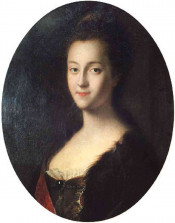
The Presidential Library rarities tell about young years of the Russian Empress Catherine the Great
May 2, 2018 marks the 289th anniversary of the birth of the Russian Empress Catherine the Great. Visitors of the Presidential Library portal can get familiar with unique publications, documents, research and other materials that were included in the collection dedicated to the Empress and became part of the large-scale electronic collection "The House of Romanov. Zemsky Sobor of 1613". Some of them tell about young years of the Empress.
Catherine the Great, the née German princess Sophia-Augusta-Frederika Anhalt-Zerbstskaya, has been ruling Russia for more than thirty years. Meanwhile, nothing, it would seem, foreshadowed such a bright future for the little girl. "The appearance of the divine tsarist princess, the daughter of a Prussian general, was a phenomenon so ordinary that it did not pay any attention to herself", - notes V. A. Bilbasov in the first volume of the 1900 edition of “The History of Catherine the Great”. Another researcher of the life of the Empress P. I. Dirin is not agreed with him. In his work "Grand Duchess Yekaterina Alekseevna" in 1884 he writes: "Catherine's birthday coincided with some holiday, on the occasion of which Stetin was announced in the morning by the church bells. Parents of the newborn were happy about this event and considered it a good omen to coincide with the holiday".
But both authors unanimously admit: Princess Sophia-August-Frederika grew up in an environment that was quite consistent with the simple way of life of the family of the Stetin commandant. The mother, according to V. A. Bilbasov, was engaged in raising children, "smart, energetic, cheerful and like all intelligent people ambitious" woman. By the way, she was the younger sister of Prince Karl-Augustus, the fiancé named Russian princess Elizabeth Petrovna, who died before the wedding.
"The girl was playing with the children of the townspeople; no one called her a princess, not even Sophia, but a diminutive Fika; at city walks in the city garden, she was lost in a crowd of children, frolicking, running with contemporaries - we read in "The History of Catherine the Great" - The persons who played with her in childhood remembered, however, later, when the princess of cersts was already a Russian empress, that during these games Fike always assumed the role of the organizer, gave a tone, commanded others; over the years, peers have noticed in her addiction to the fun inherent in more boys than girls".
In the above-mentioned edition you can find a portrait of Fiske, written from the words of Countess Mellin who knew her: "She was perfectly composed, from infancy she was distinguished by a noble bearing and was above her age. Her expression was not beautiful, but very nice, and an open look and an amiable smile made her whole figure very attractive".
P. I. Dirin writes that the future Empress did not receive proper education because of frequent trips, in which the girl accompanied her mother: "For the same travels, she served as a kind of education for her, bringing cases to observe morals, introducing her to the different courtyards, developing in her sociability of character, knowledge of light and people. At all courts Catherine with equal success produced an equally favorable impression on her".
The author of the work "The Grand Duchess Yekaterina Alekseevna" notes that in the family circle of the Stetin commandant, they talked about Russia. Perhaps, it was they who strongly influenced the formation of the character and desires of the goal-oriented girl: "Catherine should have heard from early infancy about the recent stay of Russians in that region, about the wonderful Emperor, which caused surprise and fear throughout Europe. It is known that nothing so affects the child's imagination as the exploits of great men, and it must be believed that the immensity of Russia, its mighty power, its greatness, these people, going on the Shtetinsk ships to seek happiness in the mysterious Muscovy - all belonged to the children's impressions of the future Russian Empress".
"No matter how seemingly unrealistic at the time the thought of an insignificant princess Anhalt-Zerbstka to become the Empress of the All-Russian, nevertheless a presentiment of future greatness was awakened in Catherine even in her childhood", - writes P. I. Dirin. As proof, he quotes a story written by the sovereign himself: "In 1742 or 3, I was with my mother in Braunschweig. <...> It happened here to be a bishop to the Catholic Korvenksky and with him there were several of his canons. Between them was one Mengden's house. This was practiced by the predictions and palmistry. I was asked by my mother about the Princess Marianne Bevernskaya, with whom I was very friendly, and who was loved by everyone's liking and beauty, she would not get a crown on her merits, he did not want to say anything to her. Finally he said to my mother: "On your daughter's forehead I see the crowns, at least three". My mother took it as a joke. He told her that she did not doubt about it".
According to the history, this prediction has come true: the modest Prussian Princess Sophia-Augusta-Frederika Anhalt-Zerbst was destined to become the Russian Empress, about which E. D. Zhelyabuzhsky will write in his work "The Empress Catherine the Great and Her Famous Companions" of 1874: "Subjects by Catherine called her his mother queen, foreign contemporaries were surprised by her wisdom, and the posterity honors her the Great".

